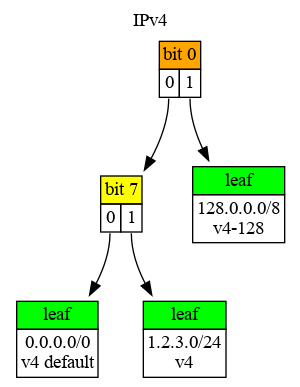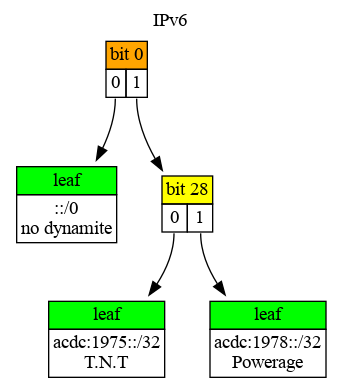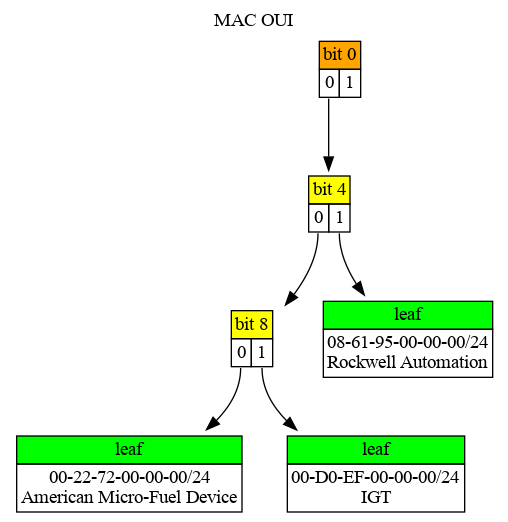View Source Iptrie
IP lookup, with longest prefix match, for IPv4, IPv6 prefixes (and others).
Iptrie manages multiple Radix trees, one for each type of prefix used as
determined by their maxlen property after encoding it as a Pfx.t/0
struct. That way, IPv4 prefixes (maxlen: 32) use a different radix tree as
opposed to IPv6 (maxlen: 128) or other types.
Iptrie has a bias towards IPv4, IPv6, EUI-48 and EUI-64, since it uses Pfx to
convert arguments to a Pfx.t/0 struct. Other types of prefixes will
require the actual Pfx.t/0 structs as arguments for the various Iptrie
functions.
Like Pfx, Iptrie tries to mirror the representation of results to the
arguments given, if possible.
IPv4/IPv6
iex> ipt = new()
...> |> put("1.2.3.0/24", "v4")
...> |> put("128.0.0.0/8", "v4-128")
...> |> put("acdc:1975::/32", "T.N.T")
...> |> put("acdc:1978::/32", "Powerage")
...> |> put("0.0.0.0/0", "v4 default")
...> |> put("::/0", "no dynamite")
iex>
iex> # 3 longest prefix matches that find the same prefix
iex> lookup(ipt, "1.2.3.128")
{"1.2.3.0/24", "v4"}
iex> lookup(ipt, {{1, 2, 3, 128}, 32})
{{{1, 2, 3, 0}, 24}, "v4"}
iex>
iex> lookup(ipt, %Pfx{bits: <<1, 2, 3, 128>>, maxlen: 32})
{%Pfx{bits: <<1, 2, 3>>, maxlen: 32}, "v4"}
iex>
iex> lookup(ipt, "acdc:1975::")
{"acdc:1975::/32", "T.N.T"}
iex>
iex> # separate trees, separate default "routes"
iex> lookup(ipt, "10.11.12.13")
{"0.0.0.0/0", "v4 default"}
iex> lookup(ipt, "abba::")
{"::/0", "no dynamite"}
iex>
iex> # visualize the IPv4 & IPv6 radix trees
iex> kv32 = fn {k, v} -> "#{Pfx.new(k, 32)}<br/>#{v}" end
iex> radix(ipt, 32)
...> |> Radix.dot(label: "IPv4", kv_tostr: kv32)
...> |> (&File.write("assets/ipv4.dot", &1)).()
iex> kv128 = fn {k, v} -> "#{Pfx.new(k, 128)}<br/>#{v}" end
iex> radix(ipt, 128)
...> |> Radix.dot(label: "IPv6", kv_tostr: kv128)
...> |> (&File.write("assets/ipv6.dot", &1)).()The radix trees in the example above look like this:


Others
Iptrie can also be used to do longest prefix match lookup for other types of prefixes, like e.g. MAC addresses:
iex> ipt = new()
...> |> put("00-22-72-00-00-00/24", "American Micro-Fuel Device")
...> |> put("00-d0-ef-00-00-00/24", "IGT")
...> |> put("08-61-95-00-00-00/24", "Rockwell Automation")
iex>
iex> lookup(ipt, "00-d0-ef-aa-bb-cc")
{"00-D0-EF-00-00-00/24", "IGT"}
iex>
iex> # longest match for partial prefix
iex> lookup(ipt, "08-61-95-11-22-00/40") |> elem(1)
"Rockwell Automation"
iex>
iex> kv48 = fn {k, v} -> "#{Pfx.new(k, 48)}<br/>#{v}" end
iex> radix(ipt, 48)
...> |> Radix.dot(label: "MAC OUI", kv_tostr: kv48)
...> |> (&File.write("assets/mac.dot", &1)).()
Iptrie recognizes EUI-48 and EUI-64 prefixes. Note that EUI-64 using ':' as
punctuation might come out as an IPv6, in which case Pfx.from_mac/1 should be
used to create a prefix before putting it in the trie.
Since prefixes are stored in specific radix trees based on the maxlen of
given prefix, you could also mix IPv4, IPv6, EUI-48, EUI-64 prefixes and
possibly others, in a single Iptrie.
IANA Special-Purpose Registries
The Iptrie.Iana module enables retrieval of properties for prefixes registered
in one of the IPv4 or IPv6 special-purpose address registries.
iex> alias Iptrie.Iana
iex> Iana.lookup("10.11.12.13")
{"10.0.0.0/8",
%{
allocation: "1996-02",
destination: true,
forward: true,
global: false,
name: "private-use",
prefix: "10.0.0.0/8",
reserved: false,
source: true,
spec: ["rfc1918"],
termination: :na
}}
# or access some property directly
iex> alias Iptrie.Iana
iex> Iana.lookup("2001::", :name)
"teredo"Examples
Minimize an Iptrie to its bare minimum by combining neighbouring prefixes and removing more specific prefixes.
iex> f = fn v1, v2 -> if v1==v2, do: {:ok, v1}, else: nil end
iex> [
...> {"1.1.1.0/25", true},
...> {"1.1.1.128/25", true},
...> {"2.2.2.0/24", true},
...> {"2.2.2.0/28", true},
...> {"2.2.2.2", true}
...> ]
...> |> new()
...> |> minimize(f)
...> |> to_list()
...> |> Enum.map(fn {k, v} -> {"#{k}", v} end)
[
{"1.1.1.0/24", true},
{"2.2.2.0/24", true}
]Summarize an Iptrie containing a list of full length prefixes within a /24, with 1 missing address:
iex> new(for x <- 0..255, do: {"1.1.1.#{x}", x})
...> |> delete("1.1.1.128")
...> |> prune(fn _ -> {:ok, 0} end, recurse: true)
...> |> to_list()
...> |> Enum.map(fn {pfx, _v} -> {"#{pfx}", "Range #{Pfx.first(pfx)} - #{Pfx.last(pfx)}"} end)
[
{"1.1.1.0/25", "Range 1.1.1.0 - 1.1.1.127"},
{"1.1.1.129", "Range 1.1.1.129 - 1.1.1.129"},
{"1.1.1.130/31", "Range 1.1.1.130 - 1.1.1.131"},
{"1.1.1.132/30", "Range 1.1.1.132 - 1.1.1.135"},
{"1.1.1.136/29", "Range 1.1.1.136 - 1.1.1.143"},
{"1.1.1.144/28", "Range 1.1.1.144 - 1.1.1.159"},
{"1.1.1.160/27", "Range 1.1.1.160 - 1.1.1.191"},
{"1.1.1.192/26", "Range 1.1.1.192 - 1.1.1.255"}
]Find the more specific entries in an Iptrie for a given search prefix
iex> new()
...> |> put("acdc:1975::/32", "TNT")
...> |> put("acdc:1977::/32", "LTBR")
...> |> put("abba:1975::/32", "RING")
...> |> more("acdc::/16")
...> |> Enum.map(fn {p, v} -> {"#{p}", v} end)
[
{"acdc:1977::/32", "LTBR"},
{"acdc:1975::/32", "TNT"}
]Find the less specific entries in an Iptrie for a given search prefix
iex> new()
...> |> put("1.1.1.0/24", 0)
...> |> put("1.1.1.0/25", 1)
...> |> put("1.1.1.0/26", 2)
...> |> put("1.1.1.0/30", 3)
...> |> put("1.1.1.128/25", 4)
...> |> less("1.1.1.3")
...> |> Enum.map(fn {pfx, v} -> {"#{pfx}", v} end)
[
{"1.1.1.0/30", 3},
{"1.1.1.0/26", 2},
{"1.1.1.0/25", 1},
{"1.1.1.0/24", 0}
]Installation
Iptrie can be installed by adding :iptrie to your
list of dependencies in mix.exs:
def deps do
[
{:iptrie, "~> 0.10"}
]
endCopyright and License
Copyright (c) 2021 hertogp
The source code is licensed under the MIT License.




